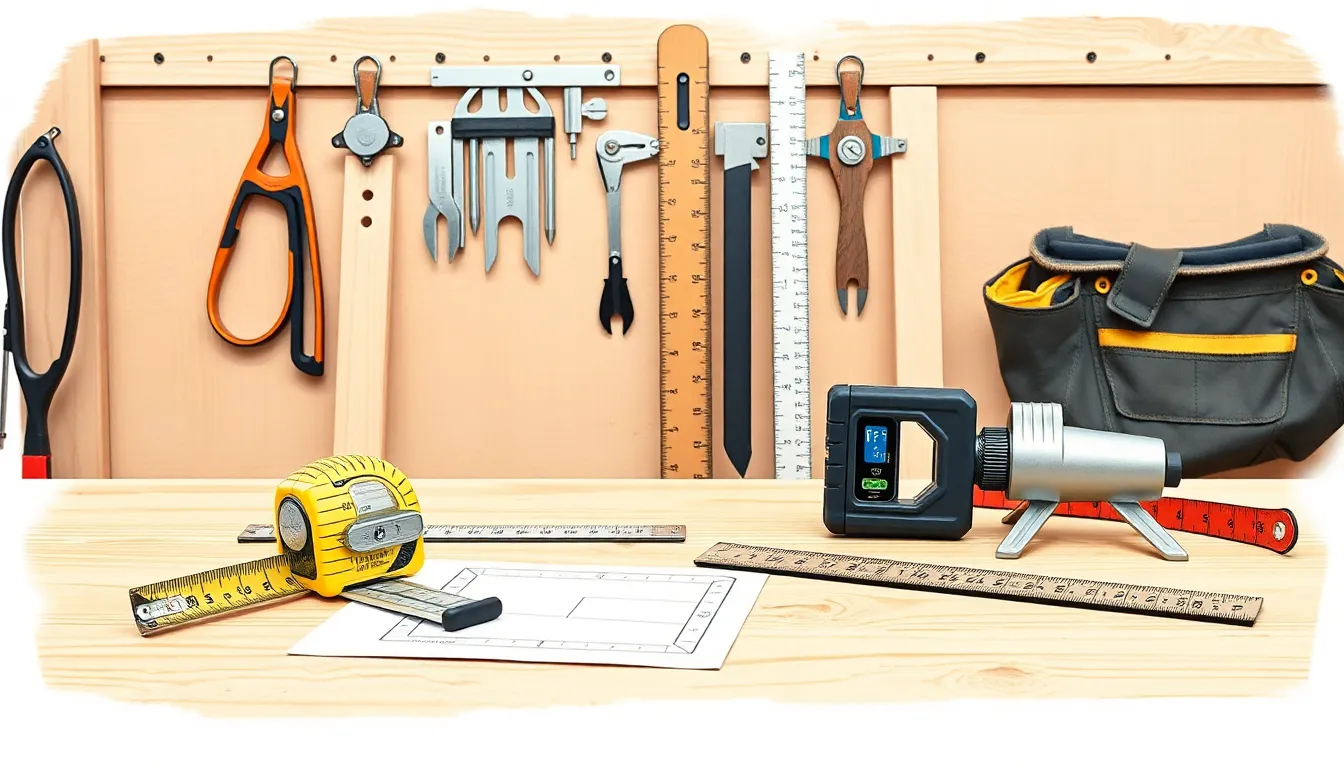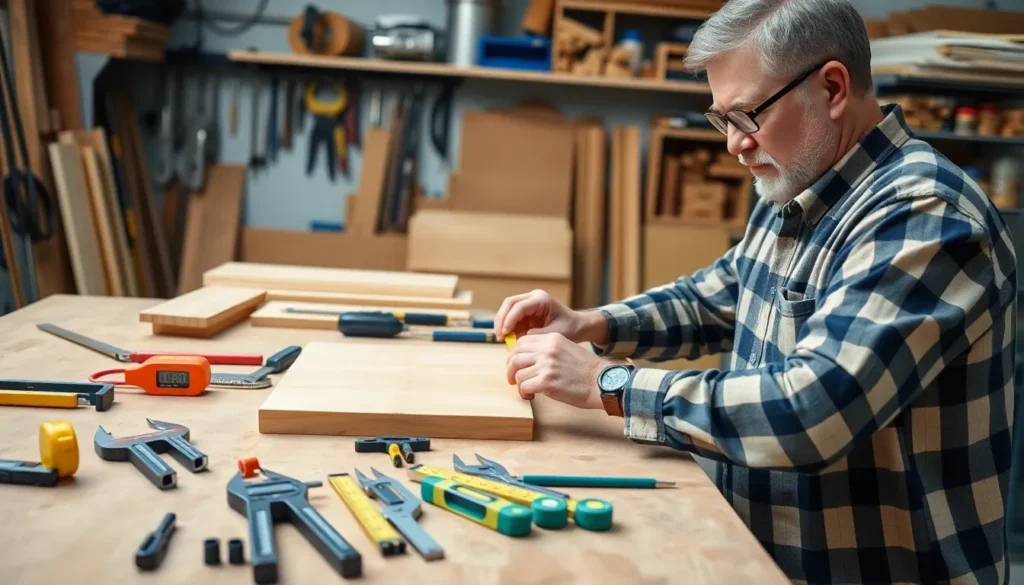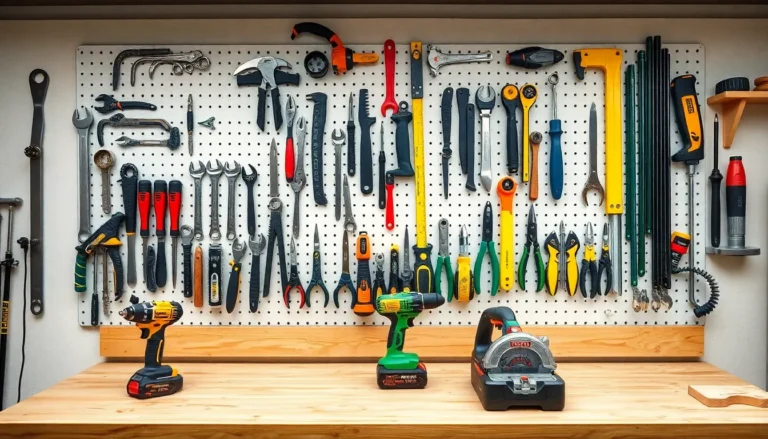In the world of workshops, measuring tools are the unsung heroes, quietly preventing chaos from breaking loose. Imagine trying to cut a piece of wood without knowing how long it really is—it’s like baking a cake without a recipe. Measuring tools help ensure precision, turning potential disasters into masterpieces.
Table of Contents
ToggleOverview of Measuring Tools in Workshop
Measuring tools play a vital role in any workshop environment. Each tool serves a specific purpose, ensuring accuracy and efficiency in various tasks. Common examples include tape measures, calipers, and levels, all essential for achieving reliable results.
Tape measures provide quick measurements for lengths and distances, offering flexibility and ease of use. Calipers allow for precise internal and external measurements, making them indispensable for intricate work. Levels ensure that surfaces are perfectly horizontal or vertical, contributing to overall project quality.
Digital measuring tools have gained popularity in recent years. Laser distance meters enable users to measure longer distances with accuracy, eliminating the need for a physical tape. This technology enhances efficiency in larger workshops and construction sites.
Furthermore, micrometers offer high precision for measuring small dimensions. These tools are crucial in machining and manufacturing processes, where minute discrepancies can lead to significant errors.
Workshops should maintain a variety of measuring tools to accommodate different projects. Regular calibration of these tools ensures their longevity and accuracy. Proper storage helps to maintain their condition, preventing wear over time.
Knowing how to use each measuring tool effectively is essential. Each tool has distinct features that cater to specific applications. Users must familiarize themselves with their operation to maximize efficiency and precision in every task. This understanding ultimately leads to better project outcomes and smoother workflows in the workshop.
Types of Measuring Tools

Measuring tools come in different categories, each designed for specific tasks. Understanding these types enhances precision in construction and manufacturing processes.
Linear Measuring Tools
Linear measuring tools include tape measures, rulers, and yardsticks. These tools provide straightforward measurements of length and distance. Tape measures are flexible and can measure large distances easily. Rulers, typically made of metal or plastic, offer accuracy in smaller projects. Yardsticks are often used in woodworking, providing a standard measurement of three feet. Each of these tools serves a distinct purpose and ensures reliable measurement.
Angular Measuring Tools
Angular measuring tools include protractors, bevel gauges, and angle finders. Protractors help in measuring angles in degrees, essential for various applications. Bevel gauges allow for the replication of angles, especially useful in carpentry tasks. Angle finders are more advanced and can digitally display angles. Incorporating these tools provides accuracy and detail when working with various materials.
Measuring Accessories
Measuring accessories enhance the functionality of main measuring tools. Items like calibration blocks, tape measure hooks, and tool belts support efficient usage. Calibration blocks ensure that measuring tools maintain accuracy over time. Tape measure hooks assist in securing measurements, preventing slippage during use. Tool belts provide easy access to the necessary tools, streamlining tasks in workshops. Each accessory adds value and contributes to the overall effectiveness of measuring processes.
Importance of Accurate Measurements
Accurate measurements play a vital role in workshop operations. They ensure the consistency and precision necessary for high-quality results.
Impact on Project Quality
Project quality depends on the accuracy of measurements. Errors in measurement lead to misaligned components and wasted materials. For instance, using a tape measure for cutting lengths guarantees the right fit when assembling parts. Precise calipers cater to small tolerances, essential in machining tasks. Each measured detail contributes to the overall integrity of the finished product. Implementing digital tools like laser distance meters boosts measurement accuracy in larger worksites. Comprehensive measurement practices ensure projects meet client specifications, resulting in satisfied customers and successful outcomes.
Safety Considerations
Safety considerations hinge on accurate measurements in workshop settings. Misleading measurements can cause miscalculations, leading to accidents. For example, improper angle measurement may result in falls or equipment damage. Using level tools ensures installation surfaces are stable, reducing risks during projects. Workers equipped with precise instruments can perform tasks confidently. Additionally, maintaining calibrated tools minimizes errors and enhances safety. A well-organized workshop with accurate measurements fosters a safer working environment, ultimately promoting productivity and well-being.
Choosing the Right Measuring Tools
Selecting appropriate measuring tools enhances accuracy and efficiency in any workshop. Different tasks call for various tools, making it essential to identify specific needs.
Factors to Consider
Accuracy remains a primary concern, as precise measurements directly affect project quality. Consider the material of the tools; durable materials lead to longevity. Additionally, the type of measurements required plays a role. For linear tasks, tape measures or rulers are ideal, while for angular tasks, protractors or bevel gauges excel. Portability can also be important. Lightweight and compact tools are better for moving between different work areas. Furthermore, ease of use improves workflow; user-friendly tools reduce the chance for error and enhance productivity.
Recommended Brands
Several brands stand out in the measuring tools market. Stanley offers a range of reliable tape measures known for their durability and accuracy. Bosch specializes in digital measuring tools like laser distance meters, recognized for their precision and ease of use. Mitutoyo produces high-quality calipers that are favored in machining for their accuracy. DeWalt delivers reliable levels designed for jobsite conditions, ensuring specification compliance. Each brand provides products that cater to various measuring needs, helping users maintain high standards in their projects.
Measuring tools are indispensable in any workshop environment. Their ability to ensure accuracy and efficiency can make the difference between success and failure in projects. By understanding the specific functions of each tool and selecting the right ones for the task at hand, users can enhance their workflow and minimize errors.
Regular maintenance and proper storage of these tools are essential for maintaining their longevity and precision. As technology advances, incorporating digital measuring tools can further streamline processes and improve accuracy. Ultimately, a well-equipped workshop with the right measuring tools fosters a safer and more productive workspace, paving the way for high-quality results.






